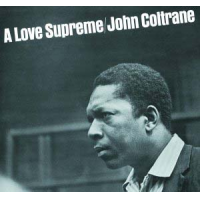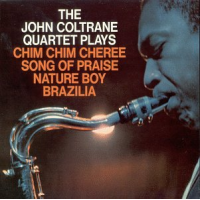Home » Jazz Articles » Album Review » John Coltrane: A Love Supreme
John Coltrane: A Love Supreme
A Love Supreme, of course, is or should be on everyone's list of great jazz albums, or of great music period. It is a four-part suite about the spiritual journey. Coltrane links the music on the album to a spiritual awakening that began for him, he said, in 1957, (enabling him to give up drugs, or at least to begin to do so) and had steadily grown in intensity in the intervening seven years. The fourth part, "Psalm," is a musical setting of the poem / psalm / hymn entitled "A Love Supreme" in the liner notes. The only quibble I have with the 20-bit release is that "Psalm" was still not made a separate track on the CD; as on the first CD release, it remains tied to Part 3, "Pursuance." There is no reason for this except carelessness, since another great Coltrane suite, Meditations, now allows the listener to cue each of its five parts, instead of the vinyl-hangover two divisions of the original release.
What makes A Love Supreme great? Unlike many other suites, A Love Supreme has a real unity of theme and mood. The intention is noble, the tone passionate, the playing flawless. There are hundreds of fine jazz albums, many of which are aided by Mr. Coltrane's playing; A Love Supreme is a fine jazz album, and more. It reaches a depth of emotional power rarely sounded in jazz. Coltrane's playing is powerful, as it is elsewhere, and lyrical, as it is elsewhere, but nowhere else does the man reach such a fullness of both these qualities at the same time. In contrast to some of his later work, Coltrane on A Love Supreme is powerful without being violent and lyrical without meandering. Jones is stunningly powerful here, and yet never overshadows the leader. Tyner and Garrison take solo turns that match Coltrane's work in tone and embellish the whole structure.
Miles Davis began playing modal tunes in the late 1950s; Coltrane, of course, was there, and together they made the first great extended statement of modal jazz, Kind of Blue. A Love Supreme stands right with that work. If you can own only two jazz albums, these two are the ones to go for; if you have room for only one Coltrane album, this one should be it.
Track Listing
1. Pt. 1 - Acknowledgement; 2. Pt. 2 - Resolution; 3. Pt. 3 - Pursuance / Pt. 4 - Psalm.
Personnel
Album information
Title: A Love Supreme | Year Released: 1997 | Record Label: Impulse!
Tags
PREVIOUS / NEXT
Support All About Jazz
 All About Jazz has been a pillar of jazz since 1995, championing it as an art form and, more importantly, supporting the musicians who make it. Our enduring commitment has made "AAJ" one of the most culturally important websites of its kind, read by hundreds of thousands of fans, musicians and industry figures every month.
All About Jazz has been a pillar of jazz since 1995, championing it as an art form and, more importantly, supporting the musicians who make it. Our enduring commitment has made "AAJ" one of the most culturally important websites of its kind, read by hundreds of thousands of fans, musicians and industry figures every month.

























